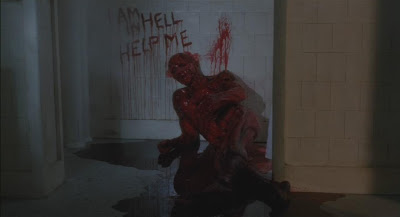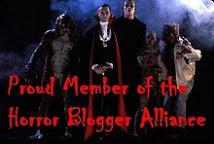(2012, Dir. by Strephon Taylor.)
There's this picture that I've seen several times on this here internet that has always spoken to me. I never bothered to look into the backstory of said picture. In fact, I think I once knew who the man in the picture was and why it was taken, but I think I mentally blocked myself from retaining that information. I mean, the picture was so cool - so why did I need to know why it was so cool? Anyway, the picture looked like this:

So yeah. That's an awesome picture. And for me, the picture was awesome because I looked at that catchphrase written on that oval backdrop, and I just smiled. I'm a dude who loves horror movies (I really hope you knew that by now, if not....SURPRISE!), and I love the idea that watching horror movies builds up a person's resolve. Perhaps it's a childish belief, and perhaps it could be said that a dedicated conviction to any hobby could build a person's resolve - but I still kind of love it. And the guy looks like a perfect time capsule back to a simpler time in horror, and I loved that too. Yet I never really looked into who this guy was.
Anyway, my computer tells me that it was September of 2010 when I downloaded this picture that I thought was awesome. And it was just about two weeks ago that a guy named Strephon Taylor contacted me about a DVD produced by
November Fire called
The Complete Bob Wilkins Creature Features. I've been pretty worn out by work lately
and also playing too many video games when I'm coming home like a zombie and it's been hard to keep up with emails, but I skimmed the dude's email and saw that this was a documentary about a horror host of days gone by and I was like "Oh, cool, I want to see that!" because I love horror hosts. And then the DVD showed up and I looked at the insanely cool packaging (more on that in a bit) and I was like "Hey....that's the guy from the picture!"
So yeah, long story short (TOO LATE!) - the guy in this picture that I've loved is a horror host named Bob Wilkins. And I didn't even make that connection, ever, until this friggin' DVD showed up on my doorstep. The point of the story? I am a big honkin' doofus!
Now that my history (or lack thereof) with Mr. Wilkins' work has been detailed in painstakingly silly detail, let's talk about the man himself. As I quickly learned from the press release
when I re-read it after realizing I am a doofus and the description on this DVD package, Bob Wilkins hosted horror movies on three television stations in California from 1966 to 1981, a fifteen year run that included more than 1800 movies. Wearing nothing more than a suit and some very distinguished glasses, Wilkins made his name by being a straight shooter about the movies he was showing - which basically means that he told the audience when the film stunk - and by showing up to work a lot of times with a lot of movies.
Proclaiming that it covers every one of those movies that Wilkins hosted, the first reaction that I had to The Complete Bob Wilkins Creature Features was the feeling of being overwhelmed. The format of a film is less like a traditional documentary and more like an ad reel for what Wilkins represented. The first thing that captured my eyes was the "ticker", of sorts, at the bottom of the screen, which scrolled through the entire documentary and listed the film or films that were shown on every single Bob Wilkins hosted show. The folks at November Fire boast that "you definitely will not catch it all on a single viewing", and this ticker alone makes their claim accurate. As these dates and titles are being shown on screen the rest of the screen is throwing tons of information at us, and there's no way I saw everything there was to see.
For most of the film, one of the comic book-esque panels on the screen shows vintage artwork for a film being mentioned or artwork from Wilkins' show. At the same time, the majority of the screen speeds through a collection of interviews with Wilkins, footage from his shows, and trailers of the films he covers. There is no narrator or host, and there are very few telling interviews with anyone but Wilkins, who is only featured in retrospective footage briefly throughout the film. The most lengthy interviews are transferred from his past shows, showing off the host's interactions with stars.
These interviews are also few and far between, but all fantastic and interesting in their own way. Christopher Lee and John Carradine represent the classic horror scene, while a sequence with John Landis, John Belushi and Donald Sutherland talking about
Animal House and their other projects of the time is completely bizarre. (At one macabre point, a potentially stoned Belushi even jokes quietly about his impending horrible death.) Perhaps the best piece of vintage Wilkins material in the film is an interview with
Blacula star William Marshall, which shows off the host's ability to work with an actor, discussing the serious tone of the film in question and how it relates to different races. The film notes early that Wilkins didn't always care for or have a ton of knowledge about the films he was showing - and that he faced some criticism for suggesting viewers change the channel at times - but each of this interviews show the man as a respectful host and a quick thinker in conversation.
The Complete Bob Wilkins Creature Features is certainly marketed to a complete genre nut or a prospective horror scholar, but I imagine some will find the product slightly disappointing. The use of film trailers seems a lot like filler at times, and I felt like there were a few gaps where the only information relevant to Wilkins and his journey in horror was the list of titles that kept showing up on the bottom of the screen. There's a lot of good information about Wilkins and his show throughout the film, but I at times felt like the amount of material was a little slim for an 87 minute documentary.
Thankfully, I am one of those genre nuts, so I wasn't too put off by interludes that showed off the films Wilkins hosted. Like most good documentaries about those in the film industry, I was left with a list of movies I wanted to watch or re-watch and plenty of reminders as to why I love movies. But most importantly, the work of Bob Wilkins that is shown here reminds me why I love spreading the word about horror cinema to all you people out there. Bob Wilkins was a trailblazer in horror cinema, and The Complete Bob Wilkins Creature Features seems like the perfect way for horror fans to experience his unique place in horror history.
If you're interested in checking out The Complete Bob Wilkins Creature Features,
head on over to November Fire or
pick up the disc at Amazon.com. On the topic of the DVD, I should note that fans of Wilkins should love the fantastic packaging job that November Fire has done here. The colorful cover shown at the top of this post is complemented on the cardboard packaging by a reproduction of a "Creature Feature Fan Club" membership card featuring Wilkins and a certificate that denotes membership in a Creature Feature Freak Fan Club. The latter comes with an honest comment that Wilkins signed off on, which I will reproduce below as an example of Wilkins' fantastic persona.
KTVU Channel 2 appreciates your loyal support and contribution
in making Horror, Fantasy, and Monster Movies an important part
of the American Way of Life. Bob Wilkins, Channel 2, the economy,
and our nation thank you. Your continued viewing of these movies on
Saturday nights will Help Keep America Strong.
- Bob Wilkins
I'd sign my name to that club any day of the week.


















































